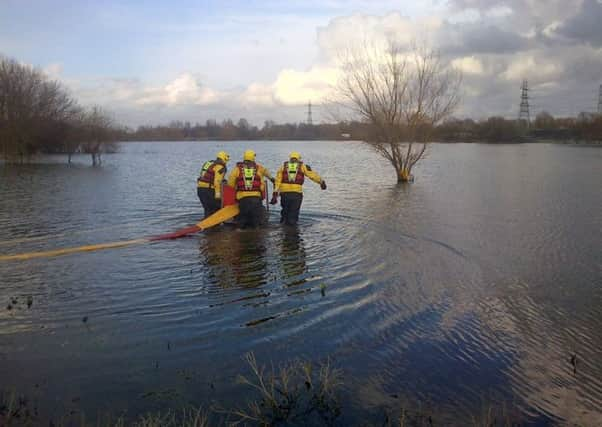Flooding ‘hitting poorer parts harder than affluent regions’


Many of the homes hit by flooding this year, as the UK suffered its wettest winter on record, were in better-off areas such as the Thames Valley.
But over the past quarter of a century, poorer places have been more than three times more likely to flood than rich areas, the study for Oxfam claims.
Advertisement
Hide AdAdvertisement
Hide AdAlmost one in five of the poorest third of neighbourhoods in England suffered floods between 1990 and 2013, compared with just one in 18 of the richest 10 per cent of areas, the research reveals.
Regionally parts of inner-city Sheffield and Hull suffered extensive flooding damage in 2007, with millions of pounds worth of damage caused to the two cities’ homes and properties.
The latter city saw around 6,500 homes flooded while people in parts of Sheffield had to be rescued by helicopter.
The extensive flooding along the Thames Valley and in South-West England saw the Government pledge much in the way of additional funding for flood defences, leading to some consternation from northern communities that they were being neglected when it came to protection from flooding.
Advertisement
Hide AdAdvertisement
Hide AdThe head of York-based insurer Aviva suggested last month that houses be given a “flood rating” so potential buyers are aware of any flooding risks to properties before they make a purchase.
The firm’s chief executive, Mark Wilson, said the risk of flooding is a “critical factor to be considered when someone is making the largest purchase of their life”.
The aid agency is calling on the Government to protect vulnerable people in the UK from climate change, which is expected to lead to more extreme weather and an increased risk of flooding.
It also wants greater action to protect people in poorer countries from the impacts of extreme weather such as droughts and floods and to cut emissions to slow the pace of climate change.
Advertisement
Hide AdAdvertisement
Hide AdOxfam is warning that, without urgent action, climate change will hit food production, pushing up food prices and damaging efforts to tackle hunger and malnutrition around the world.
Sally Copley, Oxfam’s head of UK policy, programmes and campaigns, said: “This winter’s floods dramatically demonstrated that people in the UK will not be immune from the effects of climate change.
“Around the world, climate change is hitting the poorest hardest and we must make sure this doesn’t happen overseas or on our doorstep.
“Not only are poor people hurt most by extreme weather events, they are also most vulnerable to food shortages and price increases. In a world where one in eight people already go hungry we cannot afford to put off action any longer.”
Advertisement
Hide AdAdvertisement
Hide AdOxfam is calling on the UK Government to push the European Union to a commitment to cut emissions by at least 55 per cent by 2030 – up from the 40 per cent that has been proposed in the EU’s climate and energy package for 2030.
Urgent action is also needed to move away from fossil fuels and invest in renewable energy, the aid agency said.